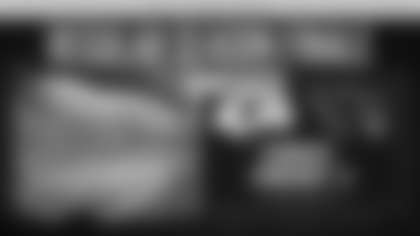25 years later, players and coaches have distinct and detailed recollections of "the tackle."
With six seconds left in Super Bowl XXXIV, the Rams had a seven point lead and needed a stop from 10 yards out. They were playing a combination man coverage with a four-three front that they'd worked on all year, and the line was told to keep Titans quarterback Steve McNair in the pocket. Defensive coordinator Peter Giunta said it was their "go-to call in the red zone."
Cornerback Todd Lyght knew then-Titans head coach Jeff Fisher wasn't going to test him in the slot on that play, because it was Fisher who drafted him to the Rams in 1991. The body language of his receiver matchup coming out of the huddle confirmed it, and Lyght signaled the rest of the team so they knew it wasn't going his way. The players made "the right call" on the combination coverage, Giunta said, and it led to the game-winning stop.
As McNair dropped back to pass, wide receiver Kevin Dyson made a quick cut to the inside, but linebacker Mike Jones was ready for it. He wrapped up Dyson, whose outstretched arm fell short of the end zone, and bedlam ensued at the one-yard line. The Rams had won their first Super Bowl.
"I do what I do all the time," Jones said. "I tackle the guy, it just happened to be the last play of the Super Bowl."

That play was a reflection of the Rams' collaborative defensive success throughout the 1999 season. Every facet of the defense complimented each other, as they'd done all year long, to make the biggest play of the season. The Rams had the fourth-best scoring defense in the league that season, and various players enjoyed career years in the process of reaching the ultimate goal. That team, which was honored at halftime of the Rams versus Eagles Sunday Night Football game this past week, still shares a special bond to this day.
The '99 Rams played a four-three base that heavily featured combination man coverage, which is what they ran to make "the tackle," while mixing in some occasional zones, Giunta said. They had effective pressure packages that were utlized most often on third down, tasking the linebackers with assorted responsibilities.
"We try to empower the players to make calls on the field based on the formation and between London (Fletcher) and Mike Jones at the linebackers and Billy Jenkins and Keith Lyle on the back end… they did a tremendous job," Giunta said.
Different players had the option to make pre-snap calls depending on where they were in the formation. Everyone on the team had to prepare for various possibilities out of different formations, and they practiced tirelessly for those scenarios.
Their philosophy, which came from Lyght, was to execute "three perfect plays, that's all we need," recalled defensive tackle D'Marco Farr. The idea was that three perfect plays would get any team off the field, and that's what they were searching for every time they stepped on the gridiron.
A lot of extra pressure was put on the defense when quarterback Trent Green went down with a season-ending knee injury in the preseason. They had no idea the offense would explode the way it did behind quarterback Kurt Warner, and they were resolved to play elite football to give what had been a losing team for the past nine seasons a shot to win.
"I think it really showed the resilience and the professionalism of the team to have that kind of adversity hit for us early in the season and still be able to come out and play our best football," Lyght said.
The defense was as good as any that year, a product of their preparation and comfortability in the system. Most of the defensive core, including Lyght, Lyle, Jenkins, Farr and defensive end Kevin Carter, had played together for a few years. They had immense trust in one another going into the '99 season, and Farr said the additions of defensive tackle Ray Agnew and Jones really completed the unit.
Plus, their preparation was second-to-none. Farr said they would have three-to-four hour practices, during which they would go through every drill twice so that the defense and offense could each execute plays correctly against each other. Instead of 24 plays, they ran 48, and that catapulted both units to the top of the league production-wise.
"Everything that we did, we did double," Farr said. "And I'm not kidding, it was ridiculous, but it did work. We did develop a deeper level of conditioning than most teams."
During the regular season especially, the defense thrived off the offense's success and adjusted their mentality to match the game scripts that would arise.
"Teams became one-dimensional," Giunta said. "So our guys were able to pin their ears back and, you know, go rush the passer… and obviously, the results speak for themselves."
They certainly do. Defensive tackle Kevin Carter totaled 20 sacks including the postseason, becoming the heaviest single-season sack leader in NFL history at 305 lbs. Lyght had a career and team-high six interceptions, including a pick-six. Jones (68 tackles and two fumbles forced and recovered) and defensive end Grant Wistrom (6.5 sacks and 10 tackles for loss) tied for the league-high in pick-sixes with two apiece.
Farr made the Pro Bowl after an 8.5-sack season, and a star was born in second-year linebacker London Fletcher, who totaled 89 tackles (12 for loss) and three sacks and later went on to play 16 years in the league. Lyle, who only played in nine games due to injury, and Devin Bush Sr. manned the backend along with Jenkins at strong safety, all of whom caught two interceptions.
Overall, the Rams' defense ranked second in interceptions that year with 29, including seven pick-sixes, which led the league. Five defenders scored in the regular season and 17 total players found the end zone.
"That was outstanding for our group, and tells you about the commitment and type of level of success that we had as a unit," Lyght said. "... So, when you talk about 'The Greatest Show on Turf,' you're talking about getting it done at the offensive side of the ball, the defensive side of the ball and special teams."
Those individual efforts were the consequences of a defense that played seamlessly together. None of those stats or accomplishments would have been possible without every player feeding off one another, both on and off the field.
"Coaches trusted us, we trusted them," Jones said. "It was just a whole bunch of things that just fell into place that worked out and helped us win the Super Bowl… It was the perfect combination of talent, coaching and camaraderie. I mean, we had everything."
During the week, the defense would watch the film from their previous game with all the corrections made so they knew which plays were executed correctly and which weren't. Giunta's wife made cakes and players brought drinks to "make it a fun time," Giunta said.
Leading up to a Week 10 matchup against the Panthers, the Rams were coming off their first two losses of the season in back-to-back games. Still, they were in high spirits, especially Giunta, as he had just adopted his youngest son. So, he brought cigars to the meeting to celebrate. But, the players said to hold off, they would smoke them all together after beating the Panthers.
That's exactly what they did. The Rams clinched the division with a 34-21 home victory over Carolina, and the entire defense stayed behind to smoke celebratory cigars in the parking lot of the TWA Dome with their leader.
This was a team coming off a 4-12 season as the 24th-ranked scoring defense in the NFL. They hadn't achieved a winning season in nine years, so clinching the division by Week 10 was significant. When they came off the field, Farr remembered thinking, "why are they putting on hats?" He was so locked into the task at hand, and so unaccustomed to winning, that he hadn't realized what they'd accomplished.
"That was our first milestone of that year," Farr said. "Actually, second, the first was… I think we got eight or nine wins and I remember (head coach Dick) Vermeil telling us, 'congratulations, we're no longer a losing football team."
To this day, the team still keeps in touch with a group chat. They care about the personal and professional lives of the people with whom they achieved the game's greatest honor. And although it's been 25 years, they all have unique perspectives on the season's final moments because each phase had a hand in it.
Giunta recalled when NFL and 49ers legend Randy Cross came to speak to the team during the season. His 49ers team won their first of three Super Bowls by way of a goal line stand against the Bengals 1982.
"He talked about different little plays from that game that were ordinary, that became extraordinary," Giunta said.
"The tackle" stemmed from a call that was as standard as they come. The team had practiced it all season, the players knew what to call within the coverage and relied on each other to do their respective jobs. But doing something ordinary correctly on the biggest stage, like making a pre-snap call or a textbook tackle, makes it extraordinary.
"After that, when Mike made the tackle, he said, 'Gosh, (Cross) was exactly right,'" Giunta said.














